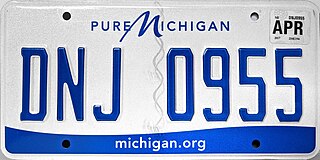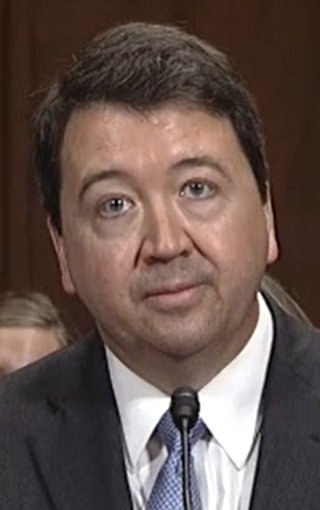Liberty Counsel is a 501(c)(3) tax-exempt religious liberty organization that engages in litigation related to evangelical Christian values. Liberty Counsel was founded in 1989 by its chairman Mathew Staver and its president Anita L. Staver, who are attorneys and married to each other. The Southern Poverty Law Center has listed Liberty Counsel as an anti-LGBT hate group, a designation the group has disputed. The group is a Christian ministry.
The Palm Sunday Compromise, formally known as the Act for the relief of the parents of Theresa Marie Schiavo, is an Act of Congress passed on March 21, 2005, to allow the case of Terri Schiavo to be moved into a federal court. The name "Palm Sunday Compromise" was coined by House Majority Leader Tom DeLay, referring to it having been passed on Palm Sunday.
In the United States, vehicle registration plates, known as license plates, are issued by a department of motor vehicles, an agency of the state or territorial government, or in the case of the District of Columbia, the district government. Some Native American tribes also issue plates. The U.S. federal government issues plates only for its own vehicle fleet and for vehicles owned by foreign diplomats. Until the 1980s, diplomatic plates were issued by the state in which the consulate or embassy was located.

John Marshall Rogers is a Senior United States circuit judge of the United States Court of Appeals for the Sixth Circuit.

Timothy Michael Tymkovich is an American lawyer who has served as a United States circuit judge of the United States Court of Appeals for the Tenth Circuit since 2003; serving as chief judge from 2015 to 2022. In November 2023, he was designated by Chief Justice John Roberts to serve as a judge of the United States Foreign Intelligence Surveillance Court of Review.
Chester John Straub is an inactive senior United States circuit judge of the United States Court of Appeals for the Second Circuit headquartered in New York City.

Stanwood Richardson Duval Jr. is a former United States district judge of the United States District Court for the Eastern District of Louisiana. He was appointed by U.S. President Bill Clinton in 1994.

Jerry Edwin Smith is an American attorney and jurist serving as a United States circuit judge of the United States Court of Appeals for the Fifth Circuit.
This is a timeline of reproductive rights legislation, a chronological list of laws and legal decisions affecting human reproductive rights. Reproductive rights are a sub-set of human rights pertaining to issues of reproduction and reproductive health. These rights may include some or all of the following: the right to legal or safe abortion, the right to birth control, the right to access quality reproductive healthcare, and the right to education and access in order to make reproductive choices free from coercion, discrimination, and violence. Reproductive rights may also include the right to receive education about contraception and sexually transmitted infections, and freedom from coerced sterilization, abortion, and contraception, and protection from practices such as female genital mutilation (FGM).

The U.S. state of Michigan first required its residents to register their motor vehicles in 1905. Registrants provided their own license plates for display until 1910, when the state began to issue plates.
The Driver's Privacy Protection Act of 1994, Title XXX of the Violent Crime Control and Law Enforcement Act, is a United States federal statute governing the privacy and disclosure of personal information gathered by state Departments of Motor Vehicles.

The legality of abortion in the United States and the various restrictions imposed on the procedure vary significantly depending on the laws of each state or other jurisdiction. Some states prohibit abortion at all stages of pregnancy with few exceptions, others permit it up to a certain point in a woman's pregnancy, while others allow abortion throughout a woman's pregnancy. In states where abortion is legal, several classes of restrictions on the procedure may exist, such as parental consent or notification laws, requirements that patients be shown an ultrasound before obtaining an abortion, mandatory waiting periods, and counselling requirements.

Jon Steven Tigar is an American lawyer serving as a United States district judge of the United States District Court for the Northern District of California. He was previously a California state court judge on the Alameda County Superior Court from 2002 to 2013.

A six-week abortion ban, also called a "fetal heartbeat bill" by proponents, is a law in the United States which makes abortion illegal as early as six weeks gestational age, which is when proponents falsely claim that a "fetal heartbeat" can be detected. Medical and reproductive health experts, including the American Medical Association and the American College of Obstetricians and Gynecologists, say that the reference to a fetal heartbeat is medically inaccurate and intentionally misleading because a conceptus is not called a fetus until eight weeks after fertilization, as well as that at four weeks after fertilization, the embryo has no heart, only a group of cells which will become a heart. Medical professionals advise that a true fetal heartbeat cannot be detected until around 17 to 20 weeks of gestation when the chambers of the heart have become sufficiently developed.
The following timeline represents formal legal changes and reforms regarding women's rights in the United States except voting rights. It includes actual law reforms as well as other formal changes, such as reforms through new interpretations of laws by precedents.

John Kenneth Bush is an American attorney and United States circuit judge of the United States Court of Appeals for the Sixth Circuit. Bush graduated from Harvard Law School and practiced in Washington, D.C., and Louisville, Kentucky, where he served as president of the local branch of the Federalist Society. In 2017, he was nominated to a seat on the Sixth Circuit by President Donald Trump.
National Institute of Family and Life Advocates v. Becerra, 585 U.S. ___ (2018), was a case before the Supreme Court of the United States addressing the constitutionality of California's FACT Act, which mandated that crisis pregnancy centers provide certain disclosures about state services. The law required that licensed centers post visible notices that other options for pregnancy, including abortion, are available from state-sponsored clinics. It also mandated that unlicensed centers post notice of their unlicensed status. The centers, typically run by Christian non-profit groups, challenged the act on the basis that it violated their free speech. After prior reviews in lower courts, the case was brought to the Supreme Court, asking "Whether the disclosures required by the California Reproductive FACT Act violate the protections set forth in the free speech clause of the First Amendment, applicable to the states through the Fourteenth Amendment."
Abortion in Louisiana is mostly illegal as of August 1, 2022.
Abortion in Florida is currently legal until the 15th week of gestation under legislation signed by Governor Ron DeSantis. Since 1989, the Florida Supreme Court has held that Article 1, Section 23 of the Florida Constitution protects access to abortion. This means that, despite the United States Supreme Court's decision in Dobbs v. Jackson Women's Health Organization, abortion remains legal in Florida. However, on April 13, 2023, the Florida Legislature passed and Governor DeSantis signed into law the Heartbeat Protection Act, which outlaws abortion after 6 weeks, with exceptions for rape, incest, human trafficking, a diagnosis of a fatal fetal abnormality, and when required to save the pregnant woman's life or protect her health. The Act takes effect if the state Supreme Court upholds the 15-week ban, currently being challenged.









